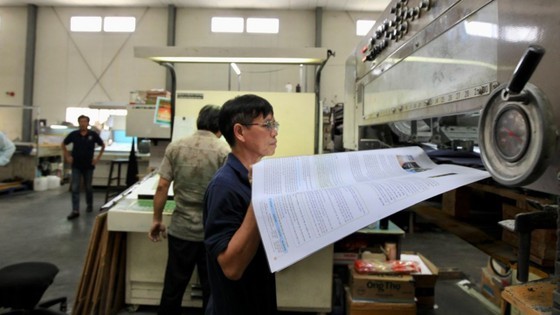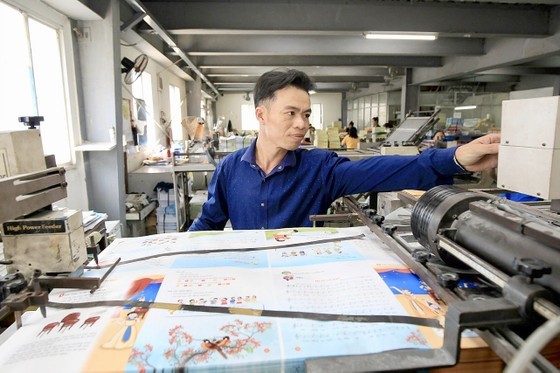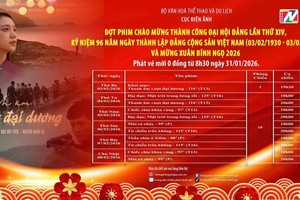 |
The printing industry is facing the imperative pressure to undergo digital transformation to survive. |
Optimizing printing costs
An outstanding event within the series of activities celebrating National Digital Transformation Day in the realms of publishing, printing, and distribution in Ho Chi Minh City is a seminar titled "How to Build a Smart Printing House." The seminar serves as a catalyst, driving printing businesses to develop smart printing models to address the issue of increasing raw materials, as well as the requirements for orders to ensure quality and meet environmental protection criteria, managed through a flexible and interconnected system.
Despite the challenges faced in 2022, the whole printing industry achieved a remarkable revenue of over VND93 trillion, up 9 percent compared to 2021. However, as noted by Associate Professor - Dr. Ngo Anh Tuan, Vice Chairman of the Vietnamese Printing Association cum Chairman of the Ho Chi Minh City Printing Association, both the national and Ho Chi Minh City's printing industry have the potential for further growth if conducive conditions are established to maximize their capabilities. One of the pressing needs at the moment is digital transformation, which involves progressing toward the establishment of smart printing facilities.
"A smart printing house, to put it simply, would be a facility that leverages the latest and most advanced printing technologies. In fact, smart printing house models have been built worldwide since 1983 and have developed stably. Currently, foreign enterprises investing in Vietnam have achieved this, while domestic businesses are facing a significant challenge," warned Associate Professor - Dr. Ngo Anh Tuan.
Mr. Nguyen Thanh Luan, Director of ITG Dx Consulting Center, a unit that has effectively supported businesses in their digital transformation efforts, pointed out that the printing industry has the particular characteristic of extremely challenging production costs, not to mention a relatively high level of competition within the sector.
"During our survey of leading companies in the printing and packaging field, it became evident that digital transformation holds the key to cost optimization, especially in the printing process. The printing phase is the starting point and the most resource-intensive aspect for printing and packaging companies," explained Mr. Luan.
"We will have to face fierce competition with foreign businesses when they bring their technology to Vietnam and print here. Vietnamese printing companies need to embark on digital transformation, moving towards establishing smart printing factories to effectively harness existing resources and operate more efficiently," said Mr. Nguyen Thanh Luan, Director of ITG Dx Consulting Center.
According to Mr. Nguyen Thanh Luan, the printing industry currently offers several opportunities, particularly in the realm of packaging printing - the sector that generates the highest revenue for the printing industry. However, despite the significant market potential, many printing enterprises still operate on a small scale and employ limited technology, leading to higher production costs. Expanding the production capacity of printing and packaging companies poses a substantial and intricate challenge to effectively address the forthcoming market demands.
Establishing open digital libraries
In addition to publishing, printing, and distribution, the publishing sector, particularly electronic publishing, also embraces current digital transformation trends. The Lotus Fund, established on December 28, 2016, following a decision by the Ho Chi Minh City People's Committee, has recently introduced the Nguyen An Ninh Digital Library - Southern Region Topics (trial version) at https://thuviennguyenaninh.vn. This open intellectual space is designed to store a variety of resource materials, including printed books, audiobooks, digitized books and documents, documentary films, and more to cater to readers and researchers for referencing, studying, and exploring the history and people of the Southern region.
 |
Printing books at a printing house in HCMC |
Dr. Quach Thu Nguyet, Chairwoman of the Lotus Fund, explained that the initial vision of the fund was to create a specialized physical library for the Southern region called Nguyen An Ninh. Alongside printed books, the library intends to expand its resources by incorporating digitized books and materials to serve readers. However, during the project's development and implementation, driven by the desire to offer quick and convenient access to a broad readership, the Nguyen An Ninh Digital Library project was prioritized. This project is designed as an open and user-friendly library that aligns with the reading, research, and information-seeking preferences of users in the digital age.
"The era of digital technology has transformed traditional reading habits. E-books, audiobooks, visual books, and interactive books, and their integrated features have become popular trends, captivating readers, especially the younger generation. A digital library is considered an open space, accessible to users anytime and anywhere. The vast volume of books, documents, and knowledge does not require an expansive physical space; it is all neatly encapsulated within the application of a website, compatible with electronic devices like computers, TV screens, tablets, and smartphones," shared Dr. Quach Thu Nguyet.
In addition to the Nguyen An Ninh Digital Library, the Saigon Entrepreneur Magazine has also launched the Vietnam Entrepreneurs' Digital Library at https://thuviendoanhnhan.vn/. According to Mr. Tran Hoang, Editor-in-Chief of the Saigon Entrepreneur Magazine, the creators of this library have a vision to meticulously and systematically preserve materials, documents, and exemplary profiles of entrepreneurs from Ho Chi Minh City and the entire country. "With this goal in mind, we introduced a demo version in 2022 and have completed the project this year. We hope this library will become a valuable resource for readers seeking comprehensive materials about entrepreneurs in Ho Chi Minh City and nationwide," Mr. Tran Hoang shared.
Mr. Lam Dinh Thang, Director of the Ho Chi Minh City Department of Information and Communications: The publishing market is vibrant
 |
With the current digital transformation orientation, despite various challenges, the publishing industry in Ho Chi Minh City is, on the whole, experiencing growth and making contributions not only to the development of culture and reading culture but also to the economic progress of the city. The expansion of the city's publishing sector indicates a lively publishing market, and it provides favorable conditions for the development of our reading culture.
Associate Professor Dr. Ngo Anh Tuan, Vice Chairman of the Vietnamese Printing Association cum Chairman of the Ho Chi Minh City Printing Association: Without smart printing facilities, orders will not be received
 |
The global printing industry has adopted the Internet of Things (IoT), and at this stage, international customers will naturally expect us to leverage the capabilities of this technology. If we have not established smart printing facilities, or if our infrastructure falls short of meeting these requirements, we definitely will not receive any orders.
Dr. Quach Thu Nguyet, Chairwoman of Lotus Fund: Digital library is an inevitable model
 |
Digital transformation is an inevitable trend in all aspects of human life. Publishing is not exempt from this transition. Intellectual assets and the knowledge-based economy are shared and connected at an incredibly rapid pace due to the advancements in science and technology in the digital age. Digital libraries will undoubtedly be a model in the future that helps people on this planet connect, share, and exchange intellectual assets at both the individual and national levels.
























